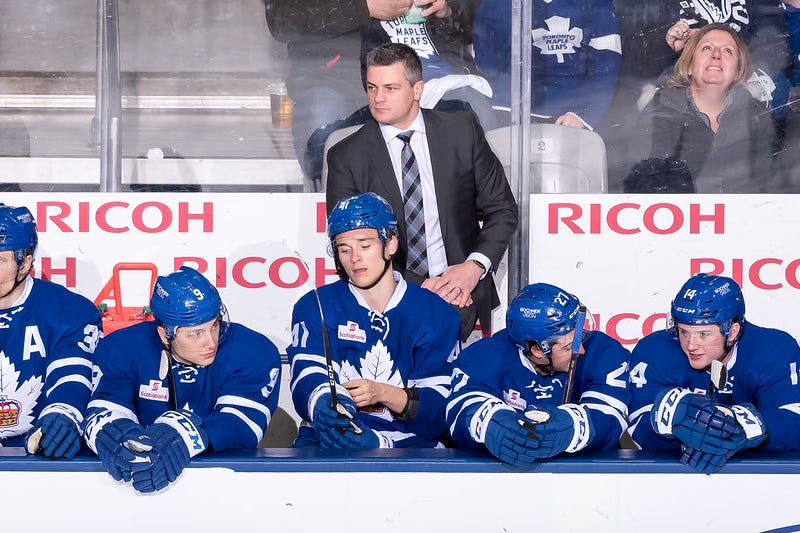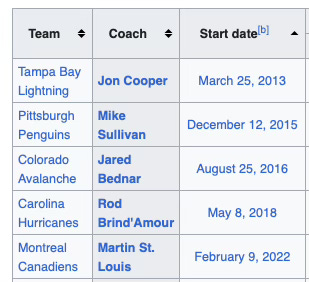When it comes to NHL coaching turnover you need to follow the money
A look at how dollars make the difference when it comes to coaching changes.
Since the start of the 2022-23 season, 27 of the 32 NHL teams have changed head coaches at least once.
Since the end of last season there have been 19 head coaching changes after Sheldon Keefe was fired on Thursday, before a two-year contract extension even kicked in.
Martin St. Louis is now technically the NHL’s fifth-most tenured head coach at his current position. Sixth when we include Andre Tourigny, although he technically changed jobs with the re-location/expansion juggling that moved the Arizona Coyotes hockey operations to Salt Lake City.
In the NBA, 13 of the 30 teams have changed coaches in that span. In the MLB 14 of the 30 teams have changed managers in that span. In the NFL, 19 of the 32 teams have changed coaches in that time.
Coaching turnover is part of the sports world in a typical three-year span, it’s probably fair to expect 50 percent of teams to make a change.
The old cliché it’s easier to fire the coach than the players applies to every sport.
But why has the NHL experienced so much overhaul?
This peaked my interest this week after Keefe was fired in Toronto, so I reached out to a number of people who have been in the room when NHL coaching contracts have been negotiated.
Coaches, agents, team executives, etc… and did so under anonymity so we could have a more open conversation about why this is the current trend.
And at the core of it all NHL owners have more of an appetite and need to change coaches than their peers in the other league.
It’s a financial thing on two fronts.
First NHL coaches don’t make a lot of money, comparatively speaking.
Peter Laviolette currently has the NHL’s highest known salary for a coach at $4.9 million this season, while the average is much closer to $2 million per season according to multiple people I’ve spoken to.
Jim Montgomery, for example, makes $3 million coaching an original six franchise. The Bruins make enough revenue off one regular season home game to cover the entire cost of one season of his services.
So firing a head coach isn’t a big financial deal for an NHL organization. It’s a sunk cost that can typically be made up within a few games of handing the coach his pink slip.
NHL owners also rely more heavily on those gate receipts than their counterparts in the other major sports. The NHL TV deal has gotten better, but the NHL is still very much a gate-driven league, and playoff revenue and the related relevancy are important points conversation in NHL hockey and business offices.
Missing the playoffs means missing out on key revenue. GMs know this, and often times the best way to protect themselves from getting the brunt of the owner’s glare is to simply fire the coach.
The Maple Leafs, for example, missed out on additional revenue by not getting to the second round of the playoffs.
They’ll technically lose money on Keefe getting paid not to coach the next two seasons, but when it comes to backend cash flow, it’s just a drop in the bucket compare to what could be earned by three additional home games.
One of the things I’ve always remembered came from Stars GM Jim Nill, who told me four or five years ago that each year there are eight successful GMs — those who advanced to the second round of the playoffs.
Because hockey is a random game and the best team doesn’t always win, getting to the second round means a team has done enough to have a better lottery ball at potential winning the whole thing. Nill, who is on the hockey ops and not the business side, then added that reaching the second round is often the difference between and frustrated and happy owner when they count their money.
So coaches become the sacrificial lambs that are easily moved or axed, and unless the pay structure and NHL financial model change drastically, owners aren’t going to have many issues paying for two orders of lamb chops in a season.




The news of Brindamour and his staff being extended got me thinking…how does it work with whole coaching staffs? Once Brindamour is extended does he then work with GM to extend the rest of the staff? Is each inidividual negotiated separately?
Another excellent story